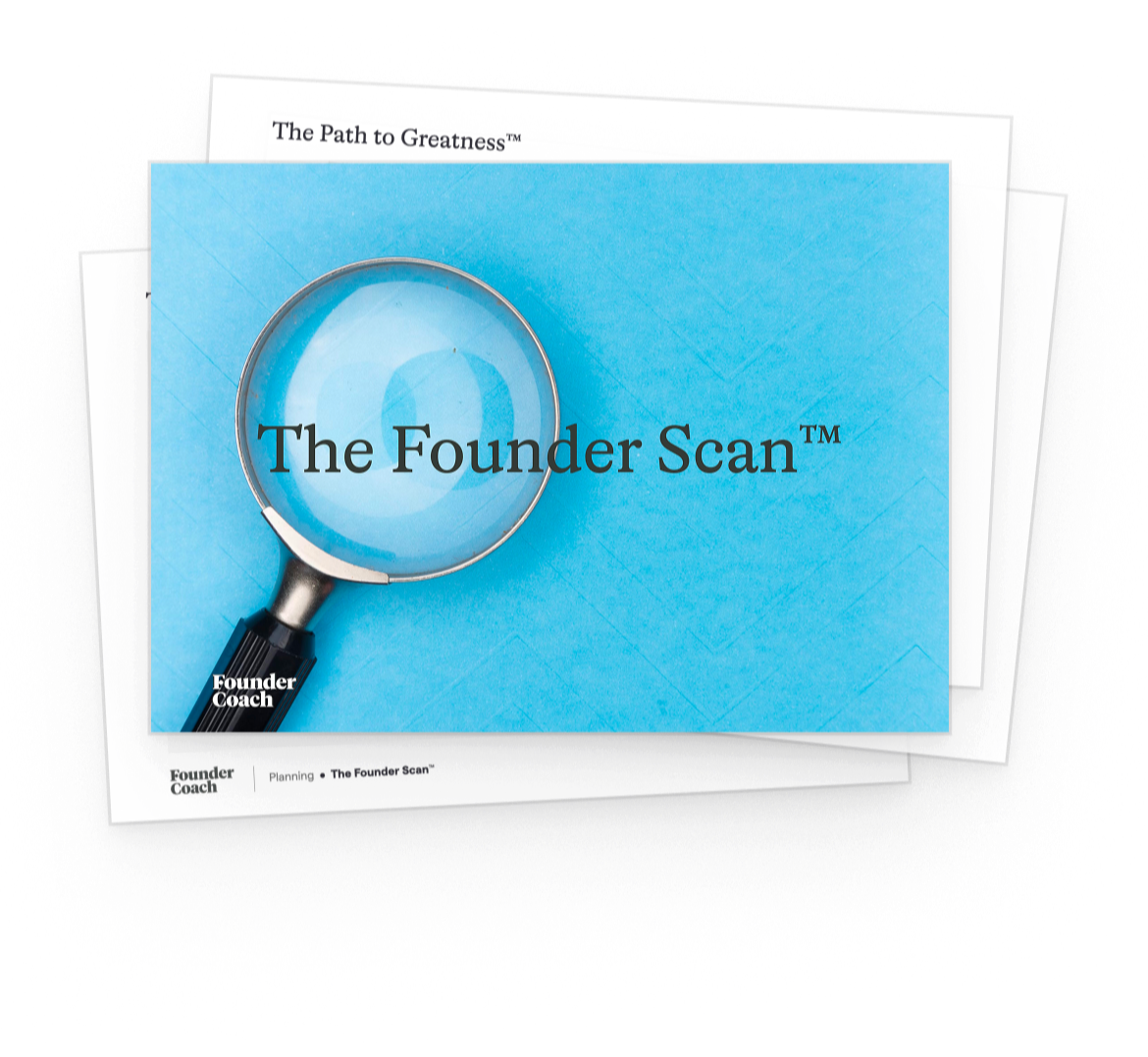How to Scale Yourself Without Losing Control

You can’t scale your company by disappearing from it. Learn how top founders redesign their role, calendar, and energy to lead at scale—without losing control.
Key Takeaways
-
You are the company’s most important asset... act like it.
-
Most founders don’t design their role, it's designed for them.
-
Your calendar impacts your culture.
-
Role, time, and energy reinforce each other—fixing one helps the rest.
-
The Founder Scan™ can help you you identify your next move.
You built this company from nothing. You know every inch of it. And now… it’s growing faster than you can manage.
You’re in every meeting, reviewing every document, answering every question. But instead of feeling like a leader, you feel like a bottleneck. And as the company scales, so does the chaos.
Everyone tells you to, “hire great people and let go of the details.”
But when you try, things slow down—or worse, fall apart.
This isn’t a management problem. It’s not a delegation problem. It’s a role design problem. And it’s one of the most dangerous inflection points for any founder.
Most founders try to scale their company by scaling everyone else. But if you don’t know how to scale yourself, nothing else scales.
This article is about what it really means to elevate your role as CEO—without losing control.
You’ll learn how legendary founders manage their calendars, their energy, and their leadership from the inside out. And you’ll walk away with a clear path to get out of the weeds… for good.
—
Want to find your growth bottleneck?
Take the Founder Scan™—a 3-minute diagnostic to see what’s holding you back.
—
The Real Reason Founders Get Stuck
Most founders know they need to “let go” to scale—but few talk about why letting go is so hard.
In the early days, you did it all... product, hiring, customers, fundraising. You were at the centre of every decision, and because you were close to everything, you moved fast.
You had context. You trusted your instincts...
And then you started to grow your team.
Now, instead of doing everything, you’re approving everything.
You’re in more meetings. You’re constantly checking in to make sure things don’t go off track. You can’t switch off, even when you try. Worst of all, you’re not doing the work that energises you anymore.
This is where most founders get stuck:
- They stop designing their role.
- They keep doing what feels urgent instead of what’s most valuable.
- They react to their calendar instead of leveraging it.
The result? A painful cycle of micromanagement, burnout, resentment—and eventually, withdrawal.
Here’s the good news:
This isn’t a permanent stat, but escaping it requires elevating your role inside the company.
Why You Must Elevate Yourself to Scale
In a founder-led company, the founder doesn’t just set the vision—they set the pace, standards, and culture of the entire organisation.
If you show up rushed and reactive, your team will too. If you’re unclear or unmotivated, it creates confusion at every level.
But when you lead with clarity, energy, and purpose, your company starts to reflect that back.
This is the paradox of leadership at scale:
The more you want the company to grow without you, the more intentional you must be about how you show up inside it.
Many founders resist this. They associate “elevating themselves” with ego—like they’re putting themselves above the team. But you're better of thinking of it like this:
Elevating yourself is an act of service.
It clarifies everyone's roles and creates space for others to lead. It raises standards across the company. And it gives the company a foundation to grow on.
But to do it, you’ll need to overcome two inner blockers:
- A discomfort with authority—especially if you’ve built your culture around being “one of the team”
- A fear of being directive—the belief that structure kills creativity, rather than unleashing it
These are old startup beliefs. And they don’t scale.
To lead at scale, you need to treat your own operating system as seriously as your team’s. That’s what the Elevate Yourself lever is all about.
It breaks into three activities where leverage accumulates fast:
- Redesign Your Role – Align your job with your unique strengths and stage
- Streamline Your Meetings – Take back control of your calendar and communication
- Manage Your Energy – Lead from a full tank, not from depletion
We’ll walk through each of them now.
1. Redesign Your Role
Most founders don’t design their role. It's just emerges from chaos.
Your responsibilities expand but your role never gets intentionally redefined. And eventually, you end up with a role you wouldn’t wish on anyone else:
- Constant context switching
- No time to think deeply
- Overseeing every decision without actually owning the outcomes
At that point, most founders start fantasising about “letting go.”
But you don’t need to let go—you need to upgrade your role to match the stage of the company.
The mindset shift
Your job isn’t to “do less.” Your job is to do more of what only you can do.
Redesigning your role means identifying where you create the most leverage—and consciously designing your job around it.
That might mean:
- Taking on fewer meetings, but making them more strategic
- Letting go of entire functions, and creating systems of accountability so others can own them end-to-end
- Spending more time thinking and writing than reacting and responding
It’s not about being hands off—it’s about being high impact.
When we work with founders inside Founder Coach, we guide them through a deliberate redesign of their role using tools like:
- Personal Advantage™ – A structured approach to uncovering your founder superpowers and aligning your role to amplify them
- The CEO Support Stack™ – A model for building a high-leverage support team (EA, founder associate, chief of staff) so you can stay in your zone of genius
- CEO Gameplan™ – A quarterly ritual to set clear goals, assess your leverage, and align your time with what matters most
These are the foundational elements of an intentional leadership system.
Most founders try to elevate their company before they elevate their role. But that’s backwards.
Upleveling starts at the top... it starts with you.
2. Streamline Your Meetings
An out-of-control calendar isn't just a scheduling problem, it’s a leadership problem.
Meetings are where your strategy either comes to life… or gets lost in the noise. They’re where decisions get made, accountability gets reinforced, and culture gets modelled in real time.
So when meetings are bloated, unfocused, or misaligned, it impacts the whole organisation.
Most founders don’t realize: your calendar is your culture in disguise.
If you want to elevate how your team operates, start with how you meet with them.
The mindset shift
As your company grows, your time becomes the scarcest resource in the business. Too many founders let their week fill up by default—endless check-ins, back-to-backs, and meetings that could have been an email.
Instead of leading from your calendar, you become trapped by it.
To scale, you need to move from reactive scheduling to intentional time allocation. That means:
- Protecting time for deep work and strategic thinking
- Standardizing and streamlining recurring meetings
- Auditing every invite to ensure it reflects your priorities
Inside Founder Coach, we help founders turn their calendar from a bottleneck into a force multiplier.
Three tools we use are:
- The Calendar Upgrade™ – A step-by-step audit to redesign your week around what’s essential (and eliminate what’s not)
- Meetings OS™ – A playbook to run high-impact meetings that create alignment, drive decisions, and reinforce accountability
- Board & The Buyer’s Mindset™ – A reframing tool to transform board meetings from investor updates into strategic leverage points
Your calendar will always fill up. The question is: will it reflect your priorities—or everyone else’s?
3. Manage Your Energy
Time is valuable—but energy is priceless. When energy is high, you’re more decisive, more creative, and bolder.
And when it’s low, everything feels heavier. You start to procrastinate, and your team starts to mirror your state.
It’s easy to treat energy as a personal issue—something to “deal with” outside of work. But in a founder-led company, your energy is a company asset. It sets the emotional tone for everyone around you.
The business can only move as fast, as clearly, and as confidently as you do.
The mindset shift
Most founders wait until signs of burnout hits before making a change. They think of self-care as indulgent, and think of their bodies and minds like machines.
But elite founders treat energy like an asset class—something to monitor, maintain, and intentionally restore.
Managing your energy means:
- Knowing what fuels and drains you
- Building in recovery, not just endurance
- Clearing emotional bottlenecks as proactively as operational ones
Inside Founder Coach, we help founders build a system for sustainable leadership—one that supports emotional resilience, clarity, and courage. Three tools that help:
- 7 Founder Needs™ – A diagnostic to assess the physical and psychological inputs that keep you at your best
- Narrative Work™ – A practice for challenging the internal stories that create fear, shame, or hesitation when you most need to lead
- Courageous Conversations™ – A method for naming and clearing tension—both with others and with yourself
Managing energy is critical for peak performance.
Why This Matters Now
Most founders wait too long to elevate themselves.
They try to fix the team, the strategy, the structure—anything but their own operating system. Not because they’re blind to the problem, but because it feels selfish to work on themselves while the company is on fire.
But here’s the paradox:
You are the company’s most important system. And if you’re underpowered, everything else runs sub-optimally.
That’s why these three levers—your role, your calendar, your energy—don’t work in isolation. They’re interconnected:
- You can’t redesign your role if your calendar keeps pulling you into the weeds.
- You can’t protect your calendar if you’re too drained to say no.
- And you can’t restore your energy if you’ve lost control of your time or purpose.
Together, these levers form a feedback loop. When one is out of alignment, the others suffer.
But when they click into place, you move faster, think more clearly, and your company reflects it.
The longer you delay this work, the more expensive the consequences become—emotionally, operationally, and financially.
If you feel stuck in the weeds, it’s not a sign that you’re failing. It’s a signal that it’s time to elevate.
Ready to Elevate?
Are you feeling stuck in the weeds, spread too thin, or unsure how to lead at the next level?
We’ve worked with hundreds of venture-backed founders to help them redesign their role, reclaim their time, and lead with clarity and confidence.
And we’ve seen it again and again... when a founder elevates, the company follows.
That’s what the Founder Scan™ is for.
A 3-minute diagnostic that reveals where your leadership is holding back growth—and what to do about it.
You’ll walk away with:
- A personalized report on your growth bottleneck
- A clear focus area to move forward with confidence
- A glimpse into the system used by some of the world’s most effective founder-CEOs
And join a growing community of founders who are scaling themselves as intentionally as they scale their companies.

